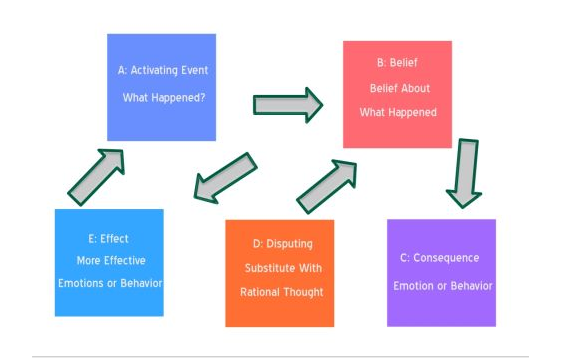What Is Rational Emotive Therapy?
What was formerly known as Rational Emotive Therapy is now most commonly referred to as Rational Emotive Behavioral Therapy or REBT. This form of therapy was founded by clinical psychologist Dr. Albert Ellis,  commonly known as the father of Cognitive-Behavioral Therapy (CBT.)
commonly known as the father of Cognitive-Behavioral Therapy (CBT.)
The idea behind REBT is that much of our emotional distress is caused by irrational beliefs and that if we can substitute those beliefs with rational ones, then we can eliminate a great deal of our distress. Dr. Ellis developed what is known as the A-B-C-D-E method of describing how these irrational beliefs are developed and how we can change them:
- A: Activating Event or Adversity (Something happened.)
- B: Belief (The beliefs we have about what happened.)
- C: Consequence (Our emotional and behavioral responses to our beliefs about what happened.)
- D: Dispute (Dispute that belief and substitute it with a rational belief.)
- E: Effect (New and more effective emotions and behaviors result from changed belief.)
Examples of Irrational Beliefs and Rational Disputes:
Please keep in mind that most people are guilty of some of these irrational beliefs at one time or another! The idea here is to become more aware of them and to think about some better beliefs that we can substitute that will make us feel better!
Irrational Belief: “No matter what I do, I must always be loved by everyone close to me or I am an awful person.”
Rational Beliefs:

- Not everyone needs to love me.
- Not everyone must love me ALL the time.
- If I do something unlovable, it does not mean I am a terrible person.
Irrational Belief: “If someone does something awful, then they are a terrible person and should be severely punished.”
Rational Beliefs:
- If somebody does something awful, the behavior was self-defeating.
- This does not mean they are a terrible person – all bad.
- What can we do to help this person?
Irrational Belief: “It is terrible when I do not get what I want.”
Rational Beliefs:
- It is not terrible, but I can be disappointed.
- I prefer to have what I want, but I do not NEED to have what I want.
- Can I change this thing that happened and make it better?
- If not, how can I learn from this, do better next time, accept this or use it to help others?
Irrational Belief: “Everything bad that happens is caused by something that happened outside of us, in the external environment, and we cannot do anything to change it. It is the fault of other people or other events.”
Rational Beliefs:
- People or events outside of us may affect certain things about us but they do not need to ruin our entire lives.
- We can change the meaning that we give to what happened and figure out what good has come out of it or what we have learned or how we can use this to do better next time.
Irrational Belief: “I must obsess and worry and become terribly upset at the possibility of something frightening or dangerous in my future.”
Rational Beliefs:
- I do not need to worry about something that has not happened yet. It might not happen!
- How can I accept the worst thing that could happen?
- How can I choose something better?
Irrational Belief: “I would rather avoid anything that could make my life difficult than to deal with it or face up to it.”
Rational Beliefs:
- If I avoid what I do not want to do, it may make my life easier for the short term, but in the long run, my life will be more difficult, so I need to face this issue and deal with it.
- Where will I be a few years from now if I avoid this? Where will I be if I face it?
- Can I accept this, learn from this, use this to help others?
Irrational Belief: “There needs to always be someone in my life who is stronger than me or smarter than me or better than me in some way so that I can depend on that person.”
Rational Beliefs:
- I will be a stronger person if I learn to depend on myself more.
- I can develop independent skills and talents if I learn to depend on myself.
- It is not always a bad thing to take risks. Sometimes risks pay off.
Irrational Belief: “I should be the best at everything I do in my life. I must always be the most successful, the smartest, the most competent in all areas of my life.”
Rational Beliefs:
- I would prefer to do well and succeed, but it is not the end of the world if I do not succeed.
- Nobody is perfect in all areas of their lives. We all have strengths, talents, and skills. We also all have weaknesses and areas where we are not as strong. This is normal.
- I need to be happy with the areas of my life where I do well, but accept the areas of my life where I do not do as well.
- I do not have to be better than everyone else and I am not better than everyone else.
Irrational Belief: “I had a bad experience in my life and now because of that experience, my entire life is ruined.”
Rational Beliefs:
- Bad things happen to most people. It does not have to ruin my whole life.
- What did I learn from this experience? How can I use it to help others?
- Sometimes we need to let go of certain people and places in our lives.
Irrational Belief: “I must control every aspect of my life every day and at all times.”
Rational Beliefs:
- There is only so much in this world that I can control.
- I cannot control everything, all the time.
- Life is full of chance and possibilities. Sometimes I can control what happens. Other times, I cannot control what happens.
Irrational Belief: “I can be happy if I do absolutely nothing.”
Rational Beliefs:
- People are happiest when they are putting their focus outside of themselves and doing things to help other people.
- People are happiest when they are in a creative state.
Irrational Belief: “My emotions have total control over me and I cannot help the way that I feel.”
Rational Beliefs:
- I can change my perception and reaction to things that happen.
- I can choose to look at what happens differently and give it a better meaning.

Dr. Ellis stresses the 3 Musts with Irrational Thoughts:
- “I must be the best at everything that I do.” Whenever a person feels that they are not the absolute “best” at everything that they do, they begin to experience feelings such as anxiety, guilt, shame, and depression.
- “Everyone must love me at all times.” People who hold this belief think that if other people do not treat them fairly at all times, then those other people are not good people and should be punished or condemned. This can lead to feelings such as rage, violence, and passive-aggression.
- “I must get what I want at all times.” People who hold this belief cannot stand the thought of not getting what they want when they want it. This can lead to feelings of self-pity.
Some core irrational beliefs revolve around such traits as demandingness, absoluteness, inflexibility, and often use phrases such as:
- Everyone does this to me

- That person always does that
- This person never does this
- Everything is a catastrophe
- That person is all bad
- I should do this
- I must have that
- I have to be this way
- I need to do that
- Everything is awful
Some different ways to dispute irrational beliefs are:
- Scientifically disputing the belief – “Is there proof that this belief is true?”
- Functionally disputing the belief – “Is this belief helping me or hurting me?”
- Logically disputing the belief – “Is this belief logical? Does it make common sense?”
The important thing to remember is that ALMOST all of us are guilty of saying these irrational phrases at one time or another.
ALMOST all of us! I can’t say ALL of us because that would be irrational! So, if you are looking at these phrases and telling yourself, “Oh no, I say these things then I must be a worthless person,” stop it right now! You are not a worthless person if you have ever had these thoughts. You are human!
The point of this article is to become more aware of some common irrational beliefs that may be causing us to feel bad and changing them to beliefs that will make us feel better. If you would like to learn how to conquer your irrational beliefs, click here to learn about the best course I know of when it comes to substituting irrational beliefs for more rational ones.
Do you see yourself or someone else in this article? Please feel free to share your frustrations in the comments below! All comments are welcomed and appreciated!



